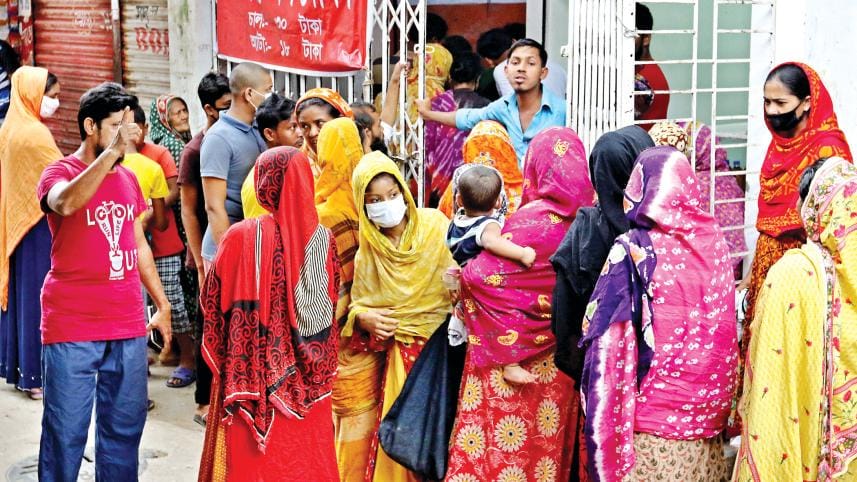Govt’s food distribution slumps

While the queue of people behind open market sale (OMS) trucks of the food ministry continues to remain fairly long, food grain distribution by the ministry was said to have dropped 19 per cent year-on-year in the first four months of the current fiscal year.
Between July 1 and November 10 this year, the food ministry distributed 9.8 lakh tonnes of rice and wheat flour among low-income people at subsidised rates under its various monetised and non-monetised programmes.
These include the OMS, food friendly programme (FFP) and vulnerable group feeding (VGF). The amount distributed was 12.08 lakh tonnes from July 1 to November 11, 2021, according to food ministry data.
Of them, sales of rice and wheat flour through the OMS declined 25 per cent year-on-year to 2.71 lakh tonnes, according to the food ministry.
One analyst expressed surprise over the dip in the distribution of staple grains as high inflation was forcing many low and fixed-income families to stand in queues behind the OMS trucks to buy rice and wheat flour at lower-than-market prices.

The Bangladesh Bureau of Statistics claims that food inflation had declined to 8.5 per cent in October this year.
The markets were portraying a different picture. At present, rice is selling at high prices. In October, prices of wheat flour, the second most consumed item, hit a new record high level as domestic availability fell for a slump in imports.
The food ministry data showed that the distribution of food grains through the FFP slumped by one third year-on-year to 2.57 lakh tonnes between July 1 and November 10 this year.
Food Secretary Md Ismiel Hossain said supply through the FFP dropped as the government cut the list of recipients by nearly 7 lakh, taking it to 43 lakh, after detecting duplication following development of a computer database.
"They were getting the support from other programmes. So, they have been excluded from the distribution this year," he said.
On the reason behind drop in the OMS, he said the Directorate General of Food reduced the sale of wheat flour as public imports of the wheat was low at the beginning of the fiscal year.
"Whatever the reasons, the decline is surprising," Khondader Golam Moazzem, research director of the Centre for Policy Dialogue.
"Food grains distribution should have been increased at this time as high inflation has squeezed the scope for low-income people to avail the minimum living standards," he said.
While this government distribution of some essential commodities such as soybean oil, lentil and sugar is a positive initiative, there is no scope to cut social safety net programmes' grains supply, he said.
Rather the government should increase distribution to ensure food security of low-income families, added Moazzem.
For the current fiscal year, the food ministry has targeted to provide 30.95 lakh tonnes of grains. It distributed 30.77 lakh tonnes in the previous fiscal year of 2021-22.
Quazi Shahabuddin, a former director general of the Bangladesh Institute of Development Studies (BIDS), said only 32 per cent of the distribution target has been achieved in nearly four and a half months.
From this, it appears that overall distribution might be lower than that last year unless efforts are there to increase distribution, he said.
Shahabuddin said as the election year was upcoming, the government should enhance distribution for its own interest.
Food Secretary Hossain said the ministry tries to increase distribution both in terms of volume and the number of beneficiaries by 20 per cent.
"We will increase distribution yet be conservative to reduce the distribution per person so that more people get the benefit," he said.
The food ministry has 16.17 lakh tonnes of cereals in stock, including 13.7 lakh tonnes of rice, as of November 16 this year, showed data by the food ministry.




 For all latest news, follow The Daily Star's Google News channel.
For all latest news, follow The Daily Star's Google News channel.
Comments